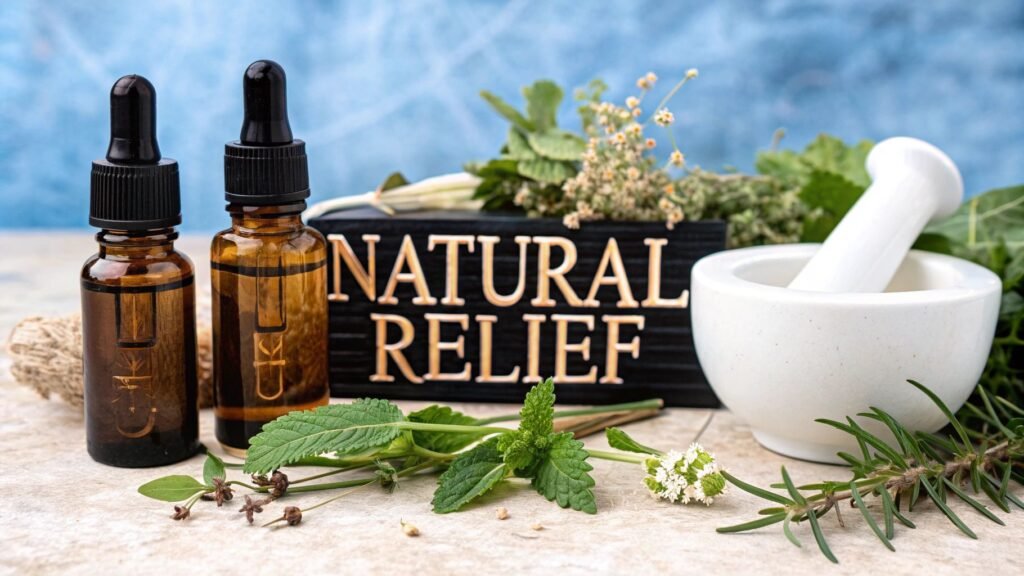Dipping your toes into the world of herbal medicine for depression can feel a bit overwhelming at first. But these plant-based approaches offer a time-tested, natural way to support mental well-being. This isn't about folklore; it's about sophisticated botanical compounds that interact with your body's complex neurochemistry. They aren't magic pills, but they can be powerful tools for influencing neurotransmitters, easing the body's stress response, and tackling the inflammation often tied to mood disorders.
Understanding How Herbal Medicine Works for Mood
For some, the idea of using plants to address something as serious as depression might seem too simple, while for others, it feels shrouded in mystery. In reality, this practice is built on thousands of years of human experience and is increasingly being validated by modern science.
A helpful way to think about it is to picture your brain's mood regulation system as a finely tuned ecosystem. When things like chronic stress, a nutrient-poor diet, or persistent inflammation throw that system out of whack, the symptoms of depression can take root. Herbal medicines work by introducing specific plant compounds that gently guide that ecosystem back toward balance. Unlike many pharmaceuticals that target a single chemical pathway, most herbs offer a more holistic, multi-faceted effect.
You can think of an herb as a skilled gardener for your brain. It doesn’t just yank out a single weed. Instead, it might also work to improve the soil quality (reduce inflammation), add essential nutrients (support neurotransmitter production), and even protect the garden from pests (manage the physical effects of stress).
A Modern Take on an Ancient Practice
Using plants for healing is hardly a new idea. Botanical remedies have been a cornerstone for treating depression and other mental health conditions for millennia in traditional systems like Traditional Chinese Medicine (TCM) and Ayurveda. It’s a truly global practice. For instance, epidemiological data shows that TCM, with its heavy reliance on herbal medicine, is used by approximately 20% of the world's population.
This tradition is alive and well in the modern world, too. In the United States, 42% of adults reported using herbal supplements as of 2020—a significant jump from previous years. You can learn more about these herbal medicine statistics to see the full picture. This long and rich history provides a massive foundation of real-world evidence, which researchers are now exploring and confirming through rigorous clinical trials. This guide is all about connecting that ancient wisdom with modern, evidence-based science.
A Quick Guide to Top Herbal Mood Supports
To give you a clearer starting point, the table below summarizes some of the most well-regarded herbs we'll cover. It breaks down their primary function and the types of depressive symptoms they are often best suited for, serving as a quick reference as you explore your options.
| Herb | Primary Mechanism of Action | Best For |
|---|---|---|
| St. John's Wort | Influences neurotransmitters like serotonin, dopamine, and norepinephrine. | Mild to moderate depression, particularly with low mood and lethargy. |
| Ashwagandha | An adaptogen that helps regulate the body's stress hormone, cortisol. | Depression linked to high stress, anxiety, and physical tension. |
| Rhodiola Rosea | Another adaptogen that enhances energy, focus, and resilience to stress. | Depression characterized by fatigue, brain fog, and burnout. |
| Saffron | Affects serotonin levels and provides potent antioxidant effects. | Mild to moderate depression, often with accompanying anxiety. |
Each of these herbs has a unique profile and works in a slightly different way. Understanding their specific strengths is the key to finding a natural approach that aligns with your individual needs and symptoms.
How Herbs Influence Your Brain and Mood
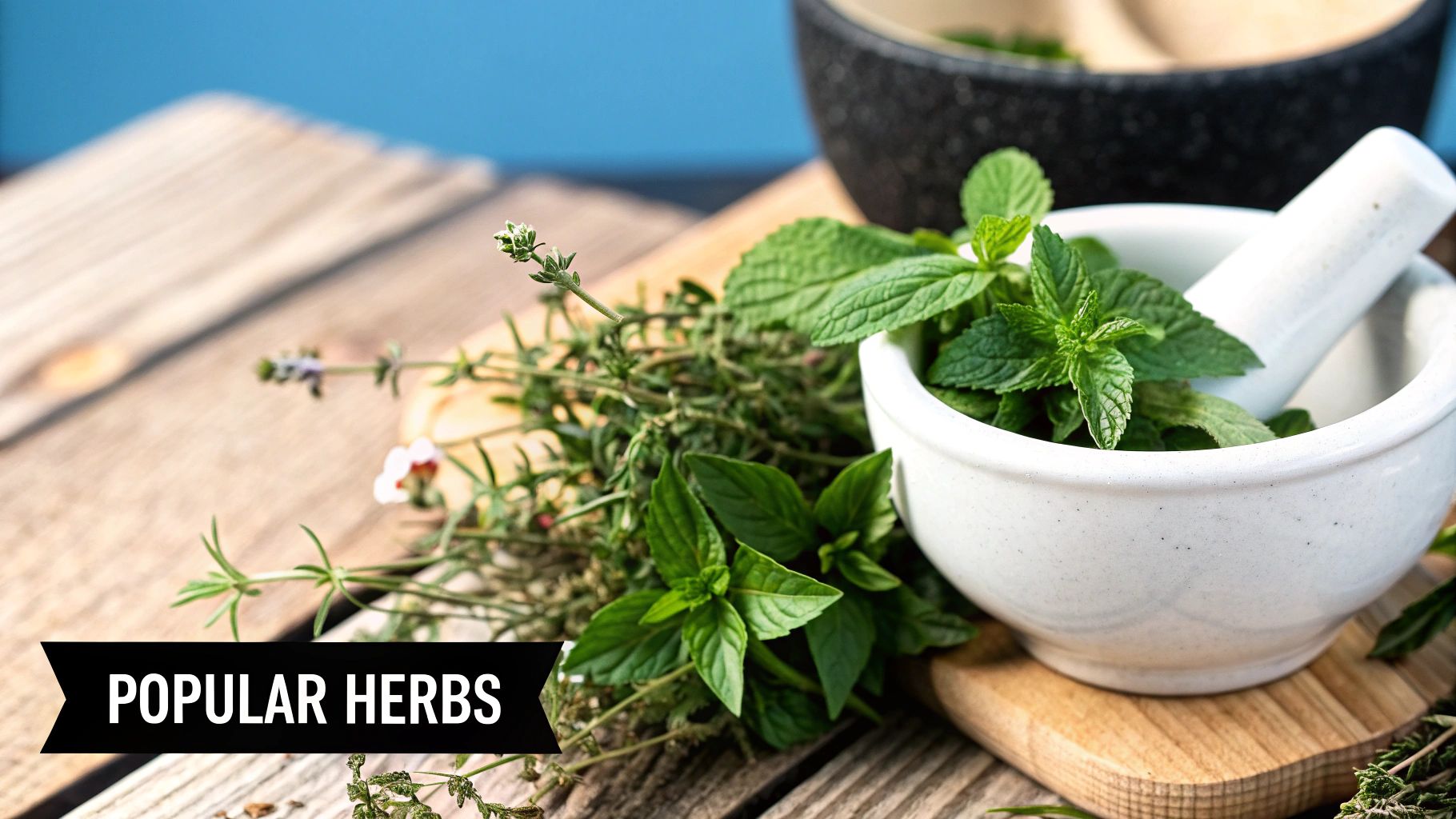
When you hear about using plants to help with something as complex as depression, it's easy to be skeptical. But it isn't about some vague "plant magic." It’s pure biochemistry. The way herbal medicine can support mood is by interacting with the very systems that govern our mental and emotional well-being.
Unlike a single-target drug, many herbs offer a more holistic effect. They work across multiple biological pathways at once, gently nudging the body back toward its natural state of balance. Think of it less like fixing one specific bug and more like giving your internal operating system a much-needed tune-up for better overall performance.
We can see these effects most clearly in three key areas: moderating the stress response, fine-tuning brain chemistry, and cooling down inflammation.
Resetting Your Body’s Stress Alarm
Your body is equipped with a sophisticated stress management tool: the hypothalamic-pituitary-adrenal (HPA) axis. This is your built-in "fire alarm." When it senses a threat—whether it's a looming deadline or a real danger—it triggers the release of stress hormones like cortisol to get you ready for "fight or flight."
The problem is, with the chronic stress that often accompanies depression, this alarm can get stuck in the "on" position. This constant flood of cortisol leaves you feeling exhausted, agitated, and emotionally depleted, feeding the cycle of depression.
This is where a remarkable class of herbs known as adaptogens shines.
Adaptogens act like an expert technician for your body's alarm system. They don’t just yank the power cord; they help recalibrate its sensitivity. This means your body can mount a strong response when needed but return to a state of calm afterward, restoring a sense of equilibrium.
Herbs like Ashwagandha and Rhodiola Rosea are classic examples. They help modulate cortisol levels, making your system far more resilient to the wear and tear of long-term stress. While this is a cornerstone of managing depression, these same principles are applied to related conditions. In fact, you can see how traditional Chinese medicine approaches anxiety by looking at these interconnected systems.
Improving Your Brain's Communication Network
Our mood is largely dictated by chemical messengers in the brain called neurotransmitters. You've probably heard of the big three: serotonin, dopamine, and norepinephrine. In depression, the communication network that uses these messengers often goes haywire.
Certain herbs act as powerful network optimizers for your brain. They don't just do one thing; they can support the system in several ways:
- Boost Availability: Some herbs, most famously St. John's Wort, help keep neurotransmitters like serotonin active in the brain for longer, an action similar to how many SSRI antidepressants work.
- Sharpen Reception: Other botanicals can make the receptors that receive these signals more sensitive. This is like turning up the volume, helping your brain better "hear" the positive mood signals being sent.
- Fuel Production: Some herbs also provide the raw materials or co-factors your body needs to manufacture these crucial neurotransmitters in the first place.
By improving the entire signaling process, these herbs can help cut through the mental fog of depression and foster a more stable, positive emotional state.
Calming Brain Inflammation
We're now discovering a powerful link between chronic, low-grade inflammation and depression. This isn't the red, swollen inflammation of a sprained ankle. It's a subtle, systemic process that can disrupt brain function and negatively impact mood.
Imagine it as static on a radio channel. This inflammatory "static" interferes with clear communication between brain cells and can even slow down the birth of new neurons (neurogenesis), a process vital for a healthy, adaptable brain.
Many medicinal herbs are loaded with potent antioxidant and anti-inflammatory compounds. These molecules go to work quieting that systemic inflammation and protecting the brain from oxidative stress. Turmeric (with its active compound, curcumin) and Saffron are standouts here, offering a profound calming and protective effect that supports long-term brain health and mood stability.
Exploring the Top Researched Herbs for Depression
Now that we've covered the science behind how certain plants can influence our mood, let's get practical. It's time to meet four of the most well-researched botanicals that have shown real promise for supporting mental well-being: St. John's Wort, Ashwagandha, Rhodiola Rosea, and Saffron.
Each of these herbs has a distinct personality and is better suited for different shades of depression. Understanding their unique profiles is the first step toward having a meaningful conversation with your healthcare provider about what might be right for you. We’ll look at each one’s background, the specific depressive symptoms it targets best, and what the science says about its effectiveness.
St. John’s Wort (Hypericum perforatum)
When people think of herbs for mood, St. John’s Wort is often the first one that comes to mind. It’s arguably the most famous and heavily studied of the bunch. This yellow-flowered plant, native to Europe and Asia, has a history stretching back centuries as a remedy for conditions affecting the nerves.
-
Best For: It's primarily recommended for mild to moderate depression. Think of the classic symptoms: a persistent low mood, finding no joy or pleasure in things you once loved (a state called anhedonia), and a general sense of lethargy.
-
How It Works: St. John's Wort's claim to fame lies in its ability to influence key brain chemicals that regulate mood—serotonin, dopamine, and norepinephrine. Its active compounds, like hypericin and hyperforin, are believed to act like gatekeepers, preventing the brain from clearing out these neurotransmitters too quickly. This leaves more of them available to help maintain a positive and stable mood.
-
Clinical Evidence: A wealth of studies has pitted St. John's Wort against standard antidepressant medications. Many have concluded that it's just as effective as common SSRIs for mild to moderate depression, and often with fewer side effects. It’s crucial to know, however, that it can have serious interactions with other medications, which we'll discuss later on.
Ashwagandha (Withania somnifera)
Ashwagandha is a true cornerstone of Ayurvedic medicine. It's often called "Indian ginseng," not because they're related, but because of its powerful rejuvenating properties. As an adaptogen, its greatest strength is helping the body adapt to and manage stress—a well-known trigger and symptom of depression.
-
Best For: This herb is a fantastic choice for depression that feels tangled up with anxiety, physical tension, and that "wired but tired" feeling. If your depression manifests as agitation, restlessness, and a sense of being constantly on edge, Ashwagandha is one to consider.
-
How It Works: Ashwagandha works its magic by helping to regulate the body's central stress response system, the HPA axis. It has a knack for lowering high levels of cortisol, our main stress hormone. By calming this overactive stress signal, Ashwagandha not only eases feelings of anxiety but also shields the body from the cumulative damage of chronic stress. This calming influence is also great for improving sleep, which is so often disrupted by depression. For those who struggle with sleep, looking into herbal remedies for insomnia can offer additional, targeted support.
-
Clinical Evidence: Study after study has shown that Ashwagandha can significantly lower cortisol levels and reduce scores on self-reported stress and anxiety questionnaires. This powerful stress-reducing effect is directly tied to improvements in mood and a greater sense of well-being.
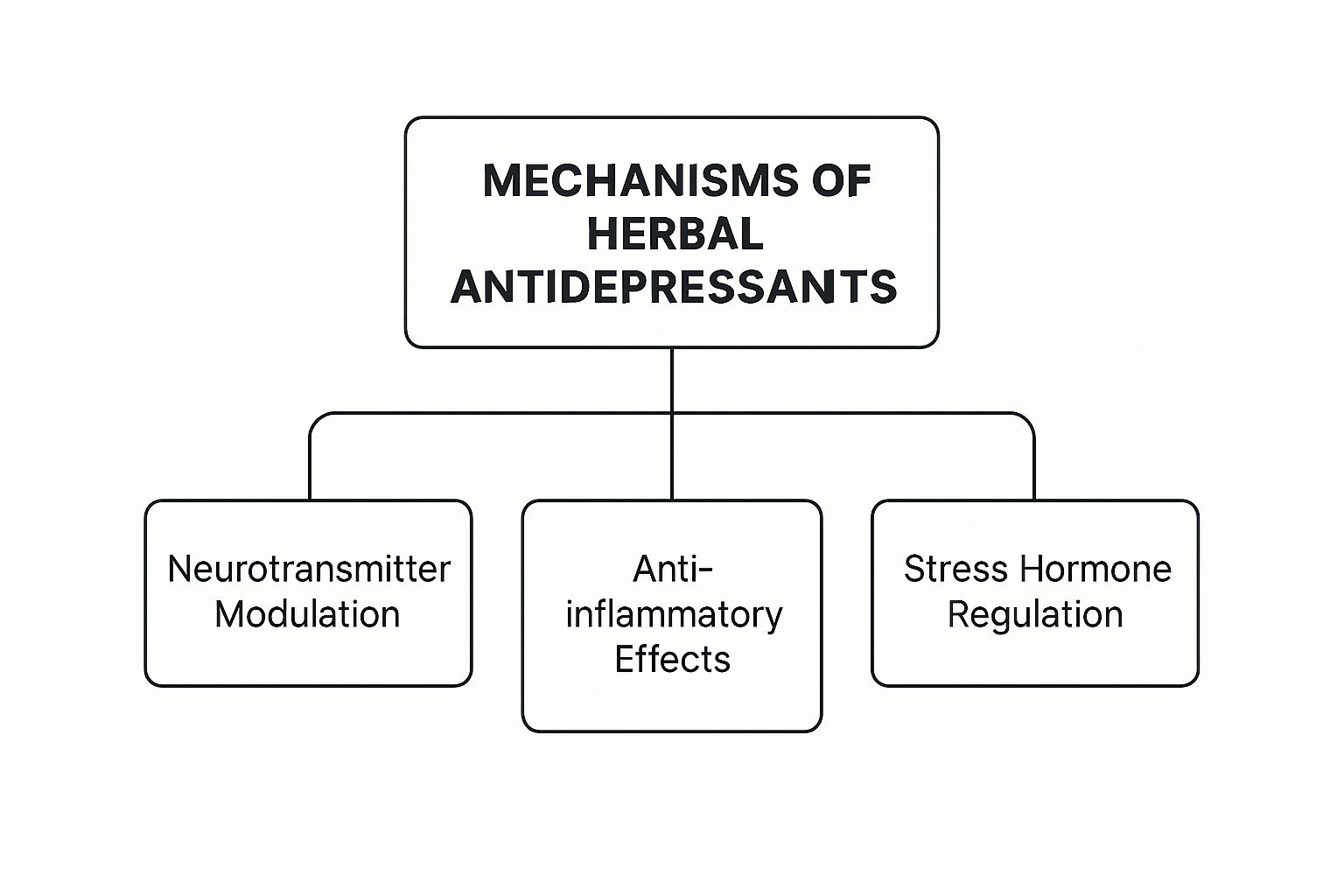
This visual helps show the multi-pronged approach of herbal medicine—it's not just about one thing, but about targeting the interconnected systems that all contribute to depression.
Rhodiola Rosea
Growing in the cold, harsh mountain regions of Europe and Asia, Rhodiola Rosea is another powerful adaptogen. Unlike the calming Ashwagandha, however, Rhodiola has a more energizing and stimulating profile. It’s earned a reputation for its incredible ability to fight fatigue and sharpen the mind.
-
Best For: Rhodiola really shines when depression is dominated by physical and mental fatigue, burnout, brain fog, and a deep lack of motivation. If you feel completely drained and struggle to concentrate, Rhodiola is likely a more fitting choice.
-
How It Works: Rhodiola goes to work by improving energy metabolism right at the cellular level. It also supports the activity of neurotransmitters like serotonin and dopamine. In short, it helps your brain and body operate more efficiently when stressed, which boosts both your stamina and your focus.
Think of Rhodiola as an energy-optimizing coach for your brain. It doesn’t just give you a jolt like caffeine; it helps your system produce and use energy more sustainably, building resilience against burnout.
- Clinical Evidence: Studies have clearly shown Rhodiola’s knack for reducing fatigue and enhancing cognitive function in people dealing with stress-related conditions. Clinical trials focused on mild to moderate depression have found it can lead to significant reductions in overall depressive symptoms.
Saffron (Crocus sativus)
Saffron is far more than just the world’s most expensive spice. For centuries, it has been used in Persian traditional medicine as a potent mood-lifter. Those vibrant red threads pack a powerful punch, thanks to their unique bioactive compounds.
-
Best For: Saffron is well-regarded for mild to moderate depression, especially when there's an anxious component. It’s also gained attention for its potential to help with mood-related issues like emotional eating and PMS.
-
How It Works: Saffron appears to work on several fronts at once. It influences serotonin levels, much like some conventional antidepressants. At the same time, its potent antioxidant and anti-inflammatory compounds, crocin and safranal, help protect brain cells from the damage caused by oxidative stress.
-
Clinical Evidence: A growing body of research backs up Saffron’s antidepressant effects. Multiple studies have found it to be just as effective as common antidepressants for managing the symptoms of mild to moderate depression, making it a very compelling natural option.
Navigating Safety Risks and Drug Interactions
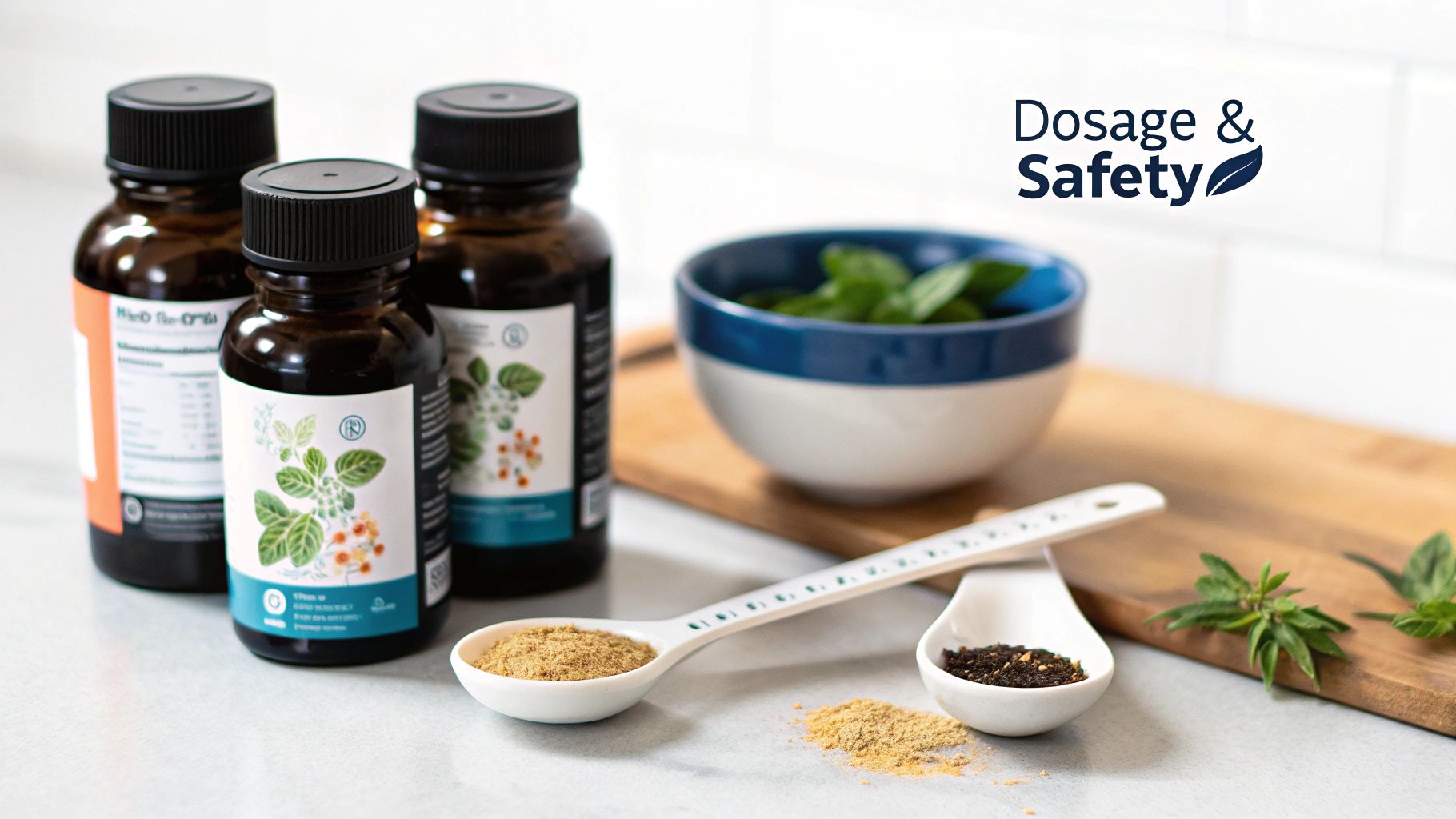
While the idea of using plants for mental wellness is incredibly appealing, we have to approach herbal medicine for depression with our eyes wide open. If there's one thing I've learned from years in this field, it's this: “natural” does not automatically mean “safe.” These botanicals are powerful, biologically active compounds that can cause side effects and serious interactions with other medications.
It's a common mistake to think of an herb as just a milder, gentler version of a pharmaceutical drug. A better way to think about them is as complex substances that demand the same respect and caution as any other treatment. When used correctly, they can be transformative. But without the right guidance, they can be risky.
This is especially true given the loose regulatory landscape of the supplement industry. While herbal medicines are a cornerstone of healthcare for billions worldwide, experts often point out the lack of consistent safety evaluations. Governments simply don't require the same rigorous pre-market testing as they do for drugs, which leaves a gap. This opens the door to ineffective or even contaminated products. Despite this, scientific interest hasn't waned; as of 2021, there were over 6,000 registered clinical trials investigating herbal treatments. You can explore the research on herbal medicine regulation and safety to get a better sense of the complexities involved.
Understanding Potential Drug Interactions
One of the most significant risks is combining herbal remedies with prescription medications. Many herbs and drugs are processed by the same enzymes in your liver. When taken together, they can essentially compete for a spot, causing one or both to become dangerously potent or, conversely, completely ineffective.
St. John’s Wort is the classic example here, as it interacts with a surprisingly long list of common medications.
- Antidepressants (SSRIs): Combining St. John's Wort with SSRIs like Prozac or Zoloft is a serious no-go. It can trigger a dangerous condition called serotonin syndrome, where serotonin levels in the brain spike, causing symptoms like agitation, confusion, a racing heart, and high blood pressure.
- Birth Control Pills: St. John's Wort is known to speed up the body's breakdown of oral contraceptives. This can reduce their effectiveness and significantly increase the risk of an unplanned pregnancy.
- Other Medications: Its reach extends to blood thinners, heart medications, and even HIV drugs, which really underscores why a conversation with a professional is non-negotiable.
Think of your body’s metabolic system as a busy highway. When you add an herbal supplement, you're introducing a new vehicle. If that vehicle doesn't play well with the others—like your prescription medications—it can cause a massive traffic jam (increasing drug levels) or a dangerous accident (adverse reactions).
How to Choose High-Quality Supplements
Walking down the supplement aisle can feel overwhelming, but you can learn to spot quality. Since the industry's quality control can be hit-or-miss, the responsibility often falls on you, the consumer, to be discerning.
Here’s a quick checklist for finding a reputable brand:
- Third-Party Testing: Look for seals from independent organizations like NSF International, USP (U.S. Pharmacopeia), or ConsumerLab.com. These seals are your assurance that the product actually contains what the label claims, is free from harmful contaminants like heavy metals, and was produced under good manufacturing practices (GMP).
- Brand Transparency: Good companies aren't shy about their process. They'll be upfront about where their herbs come from and how they test for purity and potency. If you can't find this on their website, that's a red flag.
- Standardized Extracts: For certain herbs like St. John’s Wort, a "standardized extract" is a good sign. It guarantees a consistent, measurable amount of the key active compound (like hypericin) in every single dose, which leads to a more predictable and reliable effect.
At the end of the day, the safest path forward is always in partnership with a qualified healthcare professional. Whether it's a licensed acupuncturist, a naturopathic doctor, or your primary care physician, they can help you weigh the true benefits against the risks and make sure any herbal medicine for depression is a safe and helpful part of your overall wellness plan.
Building Your Integrative Treatment Plan
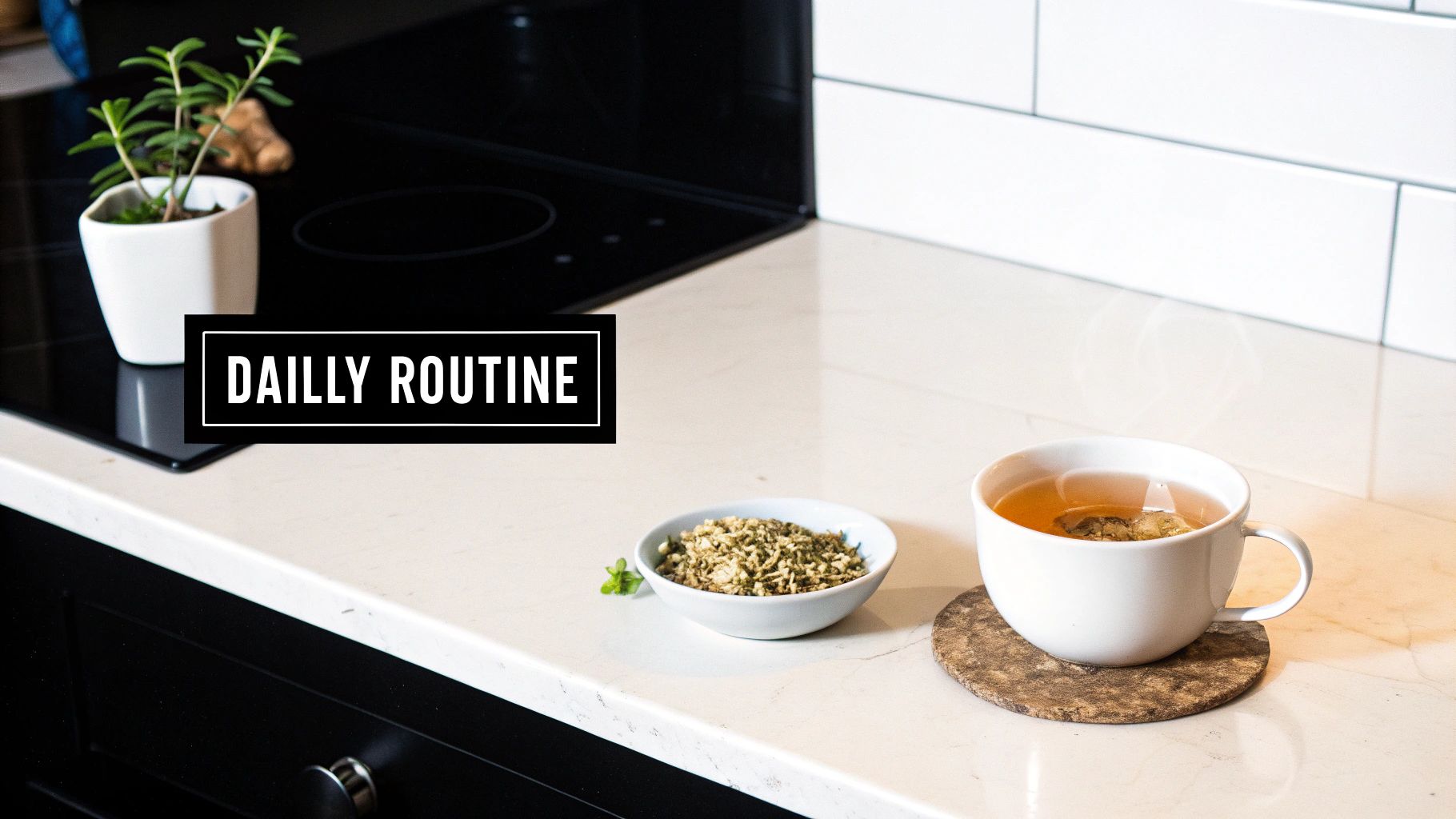
It’s tempting to think of herbal medicine for depression as an "alternative" path, separate from conventional medicine. But that view misses the point entirely. A much smarter and more effective approach is to see herbs as a powerful tool in a bigger, more personalized wellness strategy—one that thoughtfully combines the strengths of both modern science and traditional wisdom. This is what integrative care is all about.
An integrative plan doesn't make you choose between herbs and pharmaceuticals. Instead, it poses a more practical question: how can these different tools work in harmony to get you the best possible result? The goal here is synergy, not competition. We're aiming to create a treatment plan that’s as unique as your own experience with depression.
Identifying the Role of Herbs in Your Plan
Herbal medicine isn't a single, one-size-fits-all remedy. Think of it more like a versatile set of tools that can be adapted to your specific needs and circumstances.
Depending on your situation, herbs can play a few different roles:
- For Milder Symptoms: If you're navigating mild to moderate depression, a well-chosen herb like St. John’s Wort or Saffron can be a great starting point, often with a gentler side-effect profile than prescription drugs.
- As an Adjunct Therapy: Herbs can work beautifully alongside conventional treatments. For instance, if an antidepressant is helping your mood but you’re still wrestling with stress and anxiety, an adaptogen like Ashwagandha can be added to help calm your nervous system.
- To Support a Medication Taper: When you and your doctor agree it's time to lower or stop an antidepressant, certain herbs can help make that transition smoother. This is a delicate process that must always be done under strict medical supervision to be both safe and effective.
An integrative plan is like assembling a skilled team to build a house. You wouldn’t ask the plumber to do the electrical work. In the same way, you use each treatment—be it therapy, medication, or herbs—for its unique strengths to build a more stable and resilient structure of well-being.
Preparing for a Productive Doctor's Visit
Bringing up herbal medicine with your doctor can feel a bit daunting, but it doesn't have to be. The trick is to frame the conversation as an informed and proactive partner in your own healthcare journey. A collaborative spirit gets you much further than a confrontational one.
Before you walk into that appointment, do a little homework. Showing up with specific information demonstrates that you’re taking this seriously and makes it much easier for your doctor to give you helpful, relevant advice.
Come prepared with a few key things:
- Your Research: Name the specific herb you're curious about. Saying, "I've been reading about how Rhodiola might help with my fatigue and brain fog," gives the conversation a clear focus.
- Your Symptom Log: For a week or two, keep a simple journal of your main symptoms, how intense they are, and any patterns you notice. This gives your doctor invaluable context about what you're actually experiencing day-to-day.
- A List of All Substances: This is non-negotiable. Write down every single medication, supplement, and vitamin you currently take, including dosages. This is absolutely critical for your doctor to assess safety and check for potential interactions.
Questions to Ask Your Healthcare Provider
Once you're in the room, having a few smart questions ready can guide the discussion toward a productive partnership. This isn't about challenging your doctor's authority; it's about gathering the information you need to make a safe and educated decision together.
Consider asking some of these essential questions:
- "Looking at my overall health and the medications I'm on, are there any known safety risks with this herb?"
- "Is there any chance this could interact with my current treatment plan?"
- "What are your thoughts on us monitoring my progress together if I were to try this?"
- "Are there any specific signs or side effects I should be watching out for?"
This kind of collaborative dialogue reframes herbal medicine from a rogue treatment into a thoughtful component of a comprehensive, effective, and safe strategy for managing depression.
Your Questions on Herbal Medicine Answered
As you start exploring herbal medicine for depression, you're bound to have some practical questions. It's a journey that deserves careful thought and a clear understanding of what you’re getting into. My goal here is to answer the most common questions I hear, helping you move forward with confidence while putting your safety first.
How Long Does It Take for Herbal Remedies to Work?
When it comes to botanical medicine, patience is your greatest asset. Unlike some pharmaceuticals that can bring about rapid changes, herbal remedies for depression work more subtly, building their effects over time.
It’s less like flipping a switch and more like tending a garden—it takes consistent care before you see the full results.
The exact timing really depends on the herb, the quality of the product you’re using, and your own unique body chemistry. But we can talk about some general guidelines.
- St. John's Wort: Much like many conventional antidepressants, it often takes a solid 3 to 6 weeks of daily use before you'll notice a real shift in your mood.
- Adaptogens (Ashwagandha & Rhodiola): You might feel some subtle improvements in your energy or stress response within a couple of weeks. But for their full mood-stabilizing benefits to kick in, you’re typically looking at 1 to 3 months as they work to rebalance your body’s systems.
- Saffron: Some studies have shown that Saffron can start to improve mood within a few weeks, but the peak benefit is usually seen after 6 to 8 weeks of consistent use.
It's so important to set realistic expectations. I often recommend keeping a simple journal to track your symptoms. It helps you recognize those small, gradual improvements that are easy to miss day-to-day and gives you valuable information to discuss with your healthcare provider.
Can I Replace My Antidepressant with an Herb?
This is one of the most critical questions I get, and the answer is a firm no—not without direct and continuous medical supervision. Please, never abruptly stop taking a prescribed antidepressant or try to swap it out for an herb on your own. Doing so can have serious consequences, from severe withdrawal symptoms to a dangerous return of your depressive symptoms.
Transitioning off an antidepressant has to be a carefully managed process. Your doctor will design a slow, gradual tapering schedule to let your body adjust safely.
On top of that, some herbs—especially St. John's Wort—can have dangerous interactions with common antidepressants like SSRIs. Combining them can trigger a potentially life-threatening condition called serotonin syndrome, caused by a toxic buildup of serotonin in the brain. The only responsible path forward is to work hand-in-hand with your doctor. They can help you figure out if an herb could safely be added to your current treatment or support you through a medically supervised taper.
Are These Herbal Remedies Safe During Pregnancy?
The default answer here is always one of extreme caution. As a general rule, most herbs used for depression are not recommended during pregnancy or while breastfeeding. This is almost entirely due to a lack of solid safety research for these specific groups.
We know the active compounds in these powerful herbs can cross the placenta or pass into breast milk, but their potential effects on a developing baby are largely unknown. Because of this, standard medical advice is to avoid herbs like St. John's Wort, Ashwagandha, and Rhodiola during this sensitive period.
If you are pregnant, planning to become pregnant, or breastfeeding and struggling with your mental health, the most important thing you can do is have an open conversation with your OB-GYN and primary care doctor. They are your best resource for finding the safest and most effective treatments for both you and your baby.
How Do I Choose a High-Quality Herbal Supplement?
The supplement industry isn't regulated as tightly as pharmaceuticals, which means product quality can be all over the map. This really puts the responsibility on you to be a smart consumer. Making sure you get a product that's pure, safe, and effective is paramount.
Here are the key things to look for when you're on the hunt for a quality supplement:
- Third-Party Certification: This is your best seal of approval. Look for marks from independent organizations like NSF International, USP (U.S. Pharmacopeia), or ConsumerLab.com. These seals verify that the product actually contains what the label claims, is free of harmful contaminants, and was made according to good manufacturing practices (GMP).
- Brand Transparency: Good companies are open about how they source and test their products. Check their website for information on where their herbs come from and what kind of quality control they do. A lack of transparency is a major red flag.
- Standardized Extracts: For some herbs, like St. John's Wort, you'll want to look for products labeled as a "standardized extract." This ensures you get a consistent, measurable amount of the key active ingredients in every dose, leading to a much more predictable and reliable effect.
While herbs can be powerful allies, they are rarely a standalone solution. They work best as part of a comprehensive wellness plan. For those exploring non-pharmaceutical routes, learning about other options for anxiety treatment without medication can help you build a more holistic and supportive plan.
At Eric Tsai Acupuncture and Herbs, we believe in creating personalized treatment plans that integrate the best of traditional wisdom and modern knowledge. If you are seeking a supportive, expert-led approach to restoring balance and well-being, we invite you to explore our services and learn how we can help you on your path to wellness.

